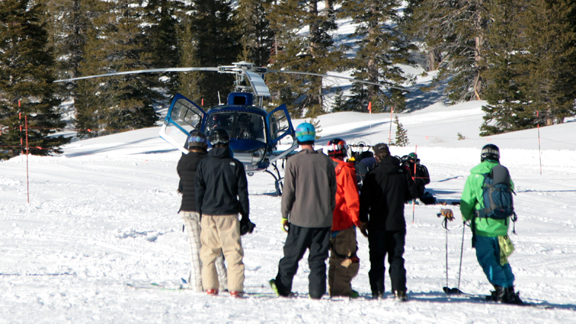
Most days, I love my job — how could you not love writing about skiing? But there are some days — like today, March 1 — when I wish I were an accountant, a hair dresser, anything but this. Today, a fellow skier died. And I was tasked with the heinous job of reporting on his death.
I didn’t know Ryan Hawks personally, but we shared many mutual friends. And like me, he’s a skier. He was a Vermont native who followed the powder train west to Utah and spent his winters chasing storms and freeskiing competitions. From what I’ve heard, Ryan was an amazing person as well — fun-loving and compassionate, adventurous and kind.
But when you’re writing a news story on someone’s death, what matters most is the facts. Especially in this era, when everyone has access to a blog, a Facebook account and a Twitter feed — it becomes that much more important for journalists to do their job, and do it right. Get the facts, report the truth. And do your best to leave your personal bias and emotions out of it.
This was really hard for me. I was there at Kirkwood on Sunday when Ryan crashed and was taken by helicopter to a hospital in Reno. The same hospital, mind you, where my older brother Miles was taken by life-flight in 2005, after he hit a tree skiing at Mammoth and suffered severe head trauma. Ryan was transferred to the same Intensive Care Unit that by brother spent several weeks in and like my brother, Ryan had a head injury, a broken pelvis and he was put into a medically-induced coma. Monday night in Reno, I sat in the parking area of the hospital while Dan, whose company, Flylow, sponsored Ryan, dropped in to check on Ryan’s condition — I couldn’t bear to go inside and see the place my brother had been, a place where so many painful memories reside.
But here’s where the stories differ: My brother survived and is leading a normal, healthy life today. Ryan wasn’t so lucky. I can’t imagine the pain his friends and family are going through right now and I’m sending them all my thoughts and prayers.
Various news sources have picked up the story on Ryan’s death, and naturally a lot of the mainstream media have offered up the sensational headlines that I feared they would: “Hawks Dead after Extreme Skiing Accident.” There is truth in that — the Freeskiing World Tour is an extreme skiing competition and what Ryan did — throw a backflip off a massive cliff — could definitely be categorized as “extreme.”
But there’s a reason the word extreme faded from skiers’ vocabulary years ago and to imply that Ryan was reckless couldn’t be farther from the truth. These athletes know the risks involved in their sport and they take calculated efforts to minimize the risks, examining take-offs and landings and determining speed and snow quality. They’re not just flinging themselves off cliffs. There’s something about this line in a story about Ryan’s death on GrindTV.com that really irks me. “[Hawks was] a rising star in the sometimes dangerous sport of big-mountain freeskiing.” Driving to the grocery store is “sometimes dangerous.”
The story on Ryan’s death on The Ski Channel (which they later fixed after I whined about it on Twitter) bugs me too. Here’s how it read initially: “Although he had traumatic injuries, it just didn’t seem like the kind of fall that would end up the way it did. It wasn’t like he fell down a rocky face or something similar. Watching on the live feed i came away with the impression he would be sore from it, that’s all,” says the writer. Readers need facts, not the writer’s half-baked opinion. To all the journalists out there, let’s not pass judgment or make implications, especially involving someone’s life and death.
Ryan was living a life most people only dream about. I’m just sorry he only got 25 years to enjoy it.
